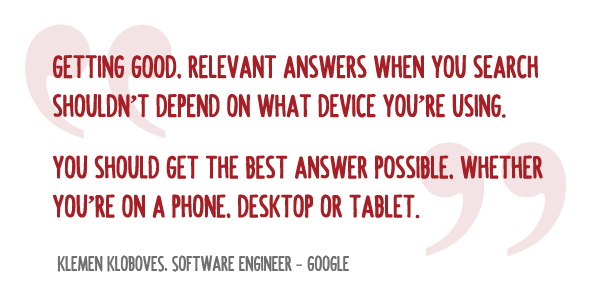We aim to respond to all messages within 1 business day. You'll be hearing from us soon!
In the meantime, perhaps you'd like to learn more...
Google Confirms Mobile-First Priority

If you’ve been following the evolution of Google’s search algorithm over the past few years, you know that serving up mobile-friendly content is one of Google’s top priorities. In an effort to ensure that everyone has access to quality content online, regardless of the device, Google has made a number of changes to reward website owners who provide content that is accessible on all devices.

In September 2015, Google further defined their commitment to mobile content by hinting that they were experimenting with a “mobile only index". That experiment is now reality with the announcement that Google have begun rolling out a mobile index that will have priority over other results. What does this mean exactly and what impact will it have on your website? Read on to find out more.
Mobile-first indexing explained
Most web pages that are crawled by Google become part of Google’s search index. Google uses a variety of signals to determine how sites will rank in search results. Historically, Google crawled the web from a desktop browser perspective and used signals from mobile-friendly content to improve a desktop website’s ranking. The creation of a mobile index means that Google is now looking at the mobile version of website pages to determine the site’s ranking. Or, as Search Engine Land explains it, “Google has started to use the mobile version of the web as their primary search engine index.”
When the roll-out of mobile-first indexing is complete, all of Google’s ranking signals will come from the mobile version of your website. If you don’t have a mobile website, you won’t disappear from rankings altogether, but you can expect to fall lower than your competitors who do. This is a significant change and something that we have anticipated for quite some time. It’s one of the reasons why we have encouraged our clients to build sites that are based on the principles of responsive website design.
Roll-out of mobile-first index
During the rollout period, Google will maintain two different algorithms to serve up results to users on mobile and desktop. When Google becomes confident that mobile-first indexing is providing quality results, it will switch over to the mobile-first algorithm entirely. While it will be based on mobile content, this index will provide listings to mobile and desktop users alike. We’re not sure exactly how this is going to work out or what the timing will be, but we’ll be paying close attention to any changes and will report back when we know more.
How will mobile-first indexing affect my ranking?
When Google announce any type of change, the big question on any website owner’s mind is always, ‘how will this help or hurt me?!’ Because Google have already been strongly promoting mobile-friendly content, this change may have a smaller impact than you might imagine. And for anyone who already has a mobile-friendly site, this change can only help.
The vast majority of our clients now have responsive websites that provide an excellent user experience regardless of device – as such, we don’t expect this change to affect our customers. If you have a website that isn’t responsive or if you have certain pages that haven’t been designed with mobile users in mind, this change may have a negative impact on your website’s position in Google’s search results.
Get ready for mobile-first indexing
If you’re concerned about the impact of this change, we encourage you to get in touch with us. Our team can use tools in the Google Search Console to determine whether or not the mobile version of your website can be indexed by Google. One of the best tools is the Fetch and Render tool. Using the mobile:smartphone user-agent, we can determine how well Google can see and index your mobile content. Then, we can help you quickly and effectively address any pages that aren’t rendering well from a mobile perspective.
If you maintain a dedicated mobile version of your website, you should be aware of how this change affects you. To help your site rank well, be sure that you provide structured markup that is relevant to each version of your website. Then, verify that the mobile version of your site can be seen by Google and that it has been added to Google’s Search Console. Alternately, you can give us a call and leave the technical work to our experts.
Let us reiterate – if you already have a mobile-friendly website that uses responsive web design techniques, or a dedicated mobile site that is a very close reflection of your desktop site, you have nothing to worry about.
Written by Mark Vassiliou
Mark is the Manager of Digital Marketing at Apex and has worked in the digital marketing industry since 2004. Prior to joining Apex he worked in a variety of traditional marketing roles in both the corporate and SME environment in NZ and abroad, but these days much prefers the tangible measurability and transparency of digital marketing.Related posts
AWESOME! LET'S GET STARTED
TELL US HOW WE CAN HELP
We aim to respond to all messages within 1 business day. You'll be hearing from us soon!
In the meantime, perhaps you'd like to learn more...






